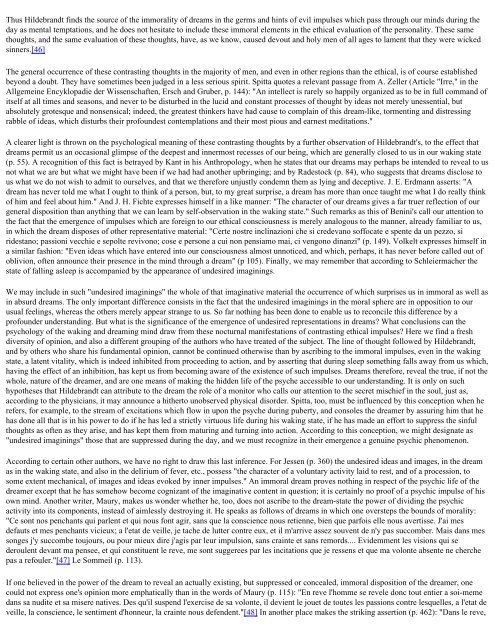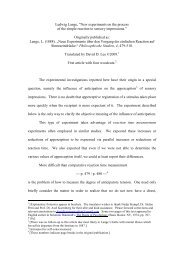The Interpretation Of Dreams Sigmund Freud (1900) PREFACE
The Interpretation Of Dreams Sigmund Freud (1900) PREFACE
The Interpretation Of Dreams Sigmund Freud (1900) PREFACE
Create successful ePaper yourself
Turn your PDF publications into a flip-book with our unique Google optimized e-Paper software.
Thus Hildebrandt finds the source of the immorality of dreams in the germs and hints of evil impulses which pass through our minds during the<br />
day as mental temptations, and he does not hesitate to include these immoral elements in the ethical evaluation of the personality. <strong>The</strong>se same<br />
thoughts, and the same evaluation of these thoughts, have, as we know, caused devout and holy men of all ages to lament that they were wicked<br />
sinners.[46]<br />
<strong>The</strong> general occurrence of these contrasting thoughts in the majority of men, and even in other regions than the ethical, is of course established<br />
beyond a doubt. <strong>The</strong>y have sometimes been judged in a less serious spirit. Spitta quotes a relevant passage from A. Zeller (Article "Irre," in the<br />
Allgemeine Encyklopadie der Wissenschaften, Ersch and Gruber, p. 144): "An intellect is rarely so happily organized as to be in full command of<br />
itself at all times and seasons, and never to be disturbed in the lucid and constant processes of thought by ideas not merely unessential, but<br />
absolutely grotesque and nonsensical; indeed, the greatest thinkers have had cause to complain of this dream-like, tormenting and distressing<br />
rabble of ideas, which disturbs their profoundest contemplations and their most pious and earnest meditations."<br />
A clearer light is thrown on the psychological meaning of these contrasting thoughts by a further observation of Hildebrandt's, to the effect that<br />
dreams permit us an occasional glimpse of the deepest and innermost recesses of our being, which are generally closed to us in our waking state<br />
(p. 55). A recognition of this fact is betrayed by Kant in his Anthropology, when he states that our dreams may perhaps be intended to reveal to us<br />
not what we are but what we might have been if we had had another upbringing; and by Radestock (p. 84), who suggests that dreams disclose to<br />
us what we do not wish to admit to ourselves, and that we therefore unjustly condemn them as lying and deceptive. J. E. Erdmann asserts: "A<br />
dream has never told me what I ought to think of a person, but, to my great surprise, a dream has more than once taught me what I do really think<br />
of him and feel about him." And J. H. Fichte expresses himself in a like manner: "<strong>The</strong> character of our dreams gives a far truer reflection of our<br />
general disposition than anything that we can learn by self-observation in the waking state." Such remarks as this of Benini's call our attention to<br />
the fact that the emergence of impulses which are foreign to our ethical consciousness is merely analogous to the manner, already familiar to us,<br />
in which the dream disposes of other representative material: "Certe nostre inclinazioni che si credevano soffocate e spente da un pezzo, si<br />
ridestano; passioni vecchie e sepolte revivono; cose e persone a cui non pensiamo mai, ci vengono dinanzi" (p. 149). Volkelt expresses himself in<br />
a similar fashion: "Even ideas which have entered into our consciousness almost unnoticed, and which, perhaps, it has never before called out of<br />
oblivion, often announce their presence in the mind through a dream" (p 105). Finally, we may remember that according to Schleiermacher the<br />
state of falling asleep is accompanied by the appearance of undesired imaginings.<br />
We may include in such "undesired imaginings" the whole of that imaginative material the occurrence of which surprises us in immoral as well as<br />
in absurd dreams. <strong>The</strong> only important difference consists in the fact that the undesired imaginings in the moral sphere are in opposition to our<br />
usual feelings, whereas the others merely appear strange to us. So far nothing has been done to enable us to reconcile this difference by a<br />
profounder understanding. But what is the significance of the emergence of undesired representations in dreams? What conclusions can the<br />
psychology of the waking and dreaming mind draw from these nocturnal manifestations of contrasting ethical impulses? Here we find a fresh<br />
diversity of opinion, and also a different grouping of the authors who have treated of the subject. <strong>The</strong> line of thought followed by Hildebrandt,<br />
and by others who share his fundamental opinion, cannot be continued otherwise than by ascribing to the immoral impulses, even in the waking<br />
state, a latent vitality, which is indeed inhibited from proceeding to action, and by asserting that during sleep something falls away from us which,<br />
having the effect of an inhibition, has kept us from becoming aware of the existence of such impulses. <strong>Dreams</strong> therefore, reveal the true, if not the<br />
whole, nature of the dreamer, and are one means of making the hidden life of the psyche accessible to our understanding. It is only on such<br />
hypotheses that Hildebrandt can attribute to the dream the role of a monitor who calls our attention to the secret mischief in the soul, just as,<br />
according to the physicians, it may announce a hitherto unobserved physical disorder. Spitta, too, must be influenced by this conception when he<br />
refers, for example, to the stream of excitations which flow in upon the psyche during puberty, and consoles the dreamer by assuring him that he<br />
has done all that is in his power to do if he has led a strictly virtuous life during his waking state, if he has made an effort to suppress the sinful<br />
thoughts as often as they arise, and has kept them from maturing and turning into action. According to this conception, we might designate as<br />
"undesired imaginings" those that are suppressed during the day, and we must recognize in their emergence a genuine psychic phenomenon.<br />
According to certain other authors, we have no right to draw this last inference. For Jessen (p. 360) the undesired ideas and images, in the dream<br />
as in the waking state, and also in the delirium of fever, etc., possess "the character of a voluntary activity laid to rest, and of a procession, to<br />
some extent mechanical, of images and ideas evoked by inner impulses." An immoral dream proves nothing in respect of the psychic life of the<br />
dreamer except that he has somehow become cognizant of the imaginative content in question; it is certainly no proof of a psychic impulse of his<br />
own mind. Another writer, Maury, makes us wonder whether he, too, does not ascribe to the dream-state the power of dividing the psychic<br />
activity into its components, instead of aimlessly destroying it. He speaks as follows of dreams in which one oversteps the bounds of morality:<br />
"Ce sont nos penchants qui parlent et qui nous font agir, sans que la conscience nous retienne, bien que parfois elle nous avertisse. J'ai mes<br />
defauts et mes penchants vicieux; a l'etat de veille, je tache de lutter contre eux, et il m'arrive assez souvent de n'y pas succomber. Mais dans mes<br />
songes j'y succombe toujours, ou pour mieux dire j'agis par leur impulsion, sans crainte et sans remords.... Evidemment les visions qui se<br />
deroulent devant ma pensee, et qui constituent le reve, me sont suggerees par les incitations que je ressens et que ma volonte absente ne cherche<br />
pas a refouler."[47] Le Sommeil (p. 113).<br />
If one believed in the power of the dream to reveal an actually existing, but suppressed or concealed, immoral disposition of the dreamer, one<br />
could not express one's opinion more emphatically than in the words of Maury (p. 115): "En reve l'homme se revele donc tout entier a soi-meme<br />
dans sa nudite et sa misere natives. Des qu'il suspend l'exercise de sa volonte, il devient le jouet de toutes les passions contre lesquelles, a l'etat de<br />
veille, la conscience, le sentiment d'honneur, la crainte nous defendent."[48] In another place makes the striking assertion (p. 462): "Dans le reve,



